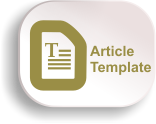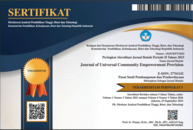Empowering MSMEs through Digital Marketing Training for Recipients of Ummul Mukminin Aisyiyah Micro Waqf Bank Capital to Increase Competitiveness in the Digital Market
DOI:
https://doi.org/10.55885/jucep.v5i2.725Keywords:
Micro Waqf Bank, MSMEs, Digital Literacy, Digital Marketing, Sharia Economic EmpowermentAbstract
As the country with the largest Muslim population in the world, Indonesia has great potential in developing the sharia economy, including strengthening the microfinance sector. Bank Waqf Mikro (BWM) is present as a sharia-based inclusive financial instrument aimed at supporting micro-enterprises around Islamic boarding schools (pesantren). However, low digital literacy and limited access to technology-based marketing remain major challenges for beneficiaries. This community service activity aims to increase the digital capacity of MSMEs assisted by BWM Ummul Mukminin Aisyiyah Makassar through digital marketing training and mentoring programs. Initial results show a 32% increase in participants' understanding of digital marketing concepts based on pre- and post-tests. As many as 85% of participants have successfully uploaded products to social media and marketplaces, although they still require further guidance. In addition, BWM's active involvement as a partner in the recruitment process, moral guidance, and evaluation, significantly contributed to the program's success. Future plans include intensive mentoring through one-on-one coaching, monitoring the program's impact through surveys and sales tracking, and developing a replication blueprint for MSMEs assisted by Aisyiyah in other regions. These findings strengthen the argument that digital training integrated with Sharia-based empowerment can be an effective strategy for increasing the competitiveness of MSMEs. With the support of the right ecosystem, similar programs can become models for sustainable economic empowerment in the era of digital transformation.
References
Achmad, W. (2023). MSMEs empowerment through digital innovation: The key to success of e-commerce in Indonesia. Daengku: Journal of Humanities and Social Sciences Innovation, 3(3), 469-475. https://doi.org/10.35877/454RI.daengku1742
Firdaus, C. B. (2025). Integrating sharia financial mechanisms with indonesia's halal economy: Opportunities, challenges, and strategies for sustainable growth. Journal of Islamic Economic Insights, 1(1), 14-28.
Gao, J., Siddik, A. B., Khawar Abbas, S., Hamayun, M., Masukujjaman, M., & Alam, S. S. (2023). Impact of E-commerce and digital marketing adoption on the financial and sustainability performance of MSMEs during the COVID-19 pandemic: An empirical study. Sustainability, 15(2), 1594. https://doi.org/10.3390/su15021594
Huda, F., Frisilia, J., Azis, A., & Yanuary, R. (2025). Development Of Optimization Strategies For MSMES'Competitive Advantages In The Digital Era. Nuansa Akademik: Jurnal Pembangunan Masyarakat, 10(1), 107-120. https://doi.org/10.47200/jnajpm.v10i1.2726
Indrawati, H., Caska, & Suarman. (2020). Barriers to technological innovations of SMEs: how to solve them?. International Journal of Innovation Science, 12(5), 545-564. https://doi.org/10.1108/IJIS-04-2020-0049
Islami, N. N., Wahyuni, S., & Puji, R. P. N. (2021, May). Digital Literation of micro, small and medium enterprises (MSMEs) in Jember District. In IOP Conference Series: Earth and Environmental Science (Vol. 747, No. 1, p. 012097). IOP Publishing. https://doi.org/10.1088/1755-1315/747/1/012097
Isnaeniah, E., Chodijah, M., Sujono, H. R., & Ihyana, F. A. (2025). Adapting Da'wah and Empowerment: A Comparative Study of Islamic Women's Organizations' Transformation in West Java. MUHARRIK: Jurnal Dakwah dan Sosial, 8(1). https://doi.org/10.37680/muharrik.v8i1.6925
Karimah, H., Ahmad, A. A., & Akbar, M. A. A. (2025). Empowering The Informal Economy Through Islamic Social Finance: Insights from Islamic Economic Principles for Inclusive Development. At-Taradhi: Jurnal Studi Ekonomi, 16(1), 14-33. https://doi.org/10.18592/taradhi.v16i1.16301
Karimullah, S. S. (2023). Influence of Progressive Islamic Da'wah on Economic Empowerment within the Muslim Community. Journal of Da'wah, 2(2), 150-174. https://doi.org/10.32939/jd.v2i2.3017
Mar, N. A., & Sari, E. P. (2025). Transformation of Muhammadiyah Da'wah in the Digital Era: Strategy, Challenges and Opportunities. International Journal of Science Technology and health, 3(1), 23-34. https://doi.org/10.63441/ijsth.v3i1.9
Maulana, F. R. (2024). From Traditional to Digital: Exploring the Online Marketing Transformation of Culinary Micro, Small, and Medium Enterprises (MSMEs) in Karawang Indonesia. Open Access Indonesia Journal of Social Sciences, 7(5), 1773-1788. https://doi.org/10.37275/oaijss.v7i5.269
Mazurkiewicz, A., & Poteralska, B. (2017). Technology transfer barriers and challenges faced by R&D organisations. Procedia engineering, 182, 457-465. https://doi.org/10.1016/j.proeng.2017.03.134
Nelly, S. (2021). Digitalization as a strategy for the revitalization of micro, small and medium enterprises (MSMEs) during the COVID-19 pandemic. Annals of the Romanian Society for Cell Biology, 25(6), 384-392.
Rachmadana, S. L., Pahmi, P., Sabaria, S., Hamsiah, H., & De Fretes, I. (2024). Digital Marketing Literacy to Sustain MSME Businesses in Southwest Papua. JBTI: Jurnal Bisnis: Teori Dan Implementasi, 15(1), 44-55. https://doi.org/10.18196/jbti.v15i1.20826
Ritonga, A. H., Nashor, N., Khair, D., & Mukmin, H. (2019). Muhammadiyah Da'wah Movement Empowerment Through The Economic And Social Orphans Orphan In The Lampung Province. Nizham Journal of Islamic Studies, 7(02), 196-213.
Rozalinda, R., & Nurhasnah, N. (2020). Bank Wakaf Mikro: Its Operations and Its Role in Empowering Communities Surrounding Islamic Boarding Schools in Indonesia. Islam Realitas: Journal of Islamic and Social Studies, 6(1), 47-63. https://doi.org/10.30983/islam_realitas.v6i1.3119
Rukmanda, M. R., Bisri, H., Jubaedah, D., Gojali, D., & Hadi, S. (2025). Empowering sharia-based Micro, Small and Medium Enterprises (MSMEs) in Indonesia: A Socioeconomic and ethical framework for inclusive development. International Journal of Nusantara Islam, 13(2), 245-256. https://doi.org/10.15575/ijni.v13i2.47733
Rusdana, N. R., Choirani, S. J., & Friska, A. S. (2022). Digital marketing communication strategy for micro, small and medium enterprises (MSMEs) in business competition. International Journal of Research and Applied Technology (INJURATECH), 2(1), 163-168. https://doi.org/10.34010/injuratech.v2i1.6913
Rusydiana, A. S., Sukmana, R., Laila, N., & Riani, R. (2025). Waqf Development Models for Sustainable Development Goals: An Analytic Network Process Approach. International Journal of Islamic Finance and Sustainable Development, 17(1), 51-74. https://doi.org/10.55188/ijifsd.v17i1.929
Santika, A. (2024). Sharia Compliance in the Development of Islamic Micro Finance as a Economic Sustainability. Journal of Islamic Economics and Philanthropy, 7(2), 85-100. https://doi.org/10.21111/jiep.v7i2.12783
Tresnasari, R., & Zulganef, Z. (2023). Increasing MSME performance through institutional strengthening, entrepreneurship, and digital marketing. International Journal of Research in Community Services, 4(1), 11-17. https://doi.org/10.46336/ijrcs.v4i1.383
Trisninawati, T., & Sartika, D. (2024). Digital literacy model to improve the marketing skills of micro, small, and medium enterprises women with a community-based educational approach. JPPI (Jurnal Penelitian Pendidikan Indonesia), 10(2), 952-960. https://doi.org/10.29210/020244149
Wahyuni, S., Widodo, J., Zulianto, M., & Islami, N. N. (2020, May). The analysis of e-commerce utilization in Micro, Small and Medium Enterprises (MSMEs) at Jember. In IOP conference series: Earth and environmental science (Vol. 485, No. 1, p. 012037). IOP Publishing. https://doi.org/10.1088/1755-1315/485/1/012037

Downloads
Published
How to Cite
Issue
Section
License
Copyright (c) 2025 Journal of Universal Community Empowerment Provision

This work is licensed under a Creative Commons Attribution-ShareAlike 4.0 International License.















